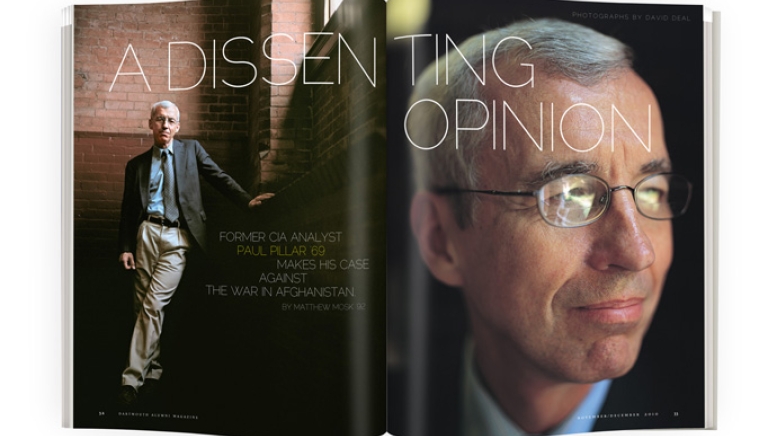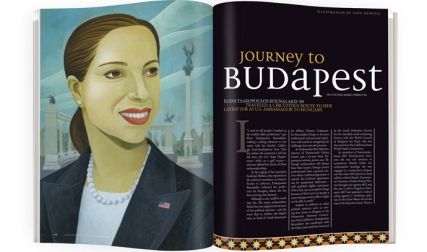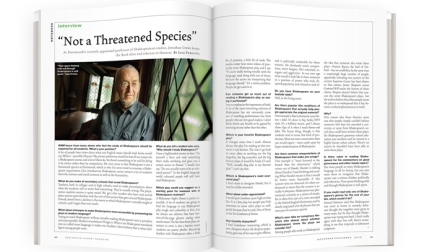In late January of 2003 the Central Intelligence Agency delivered two top-secret documents to the desks of key decision-makers around Washington, D.C. The president’s national security advisor received copies, as did top brass at the departments of defense and state, the NSA and the White House.
Arriving less than eight weeks before President George W. Bush launched the U.S. invasion of Iraq, the two blunt reports represented a last-ditch attempt by senior intelligence officers to warn of dire consequences should the nation plunge into war. One of the papers was titled “Principal Challenges in Post-Saddam Iraq.” The other was “Regional Consequences of Regime Change in Iraq.” Both provided a startlingly accurate, bleak portrait of what was about to unfold.
Instantly the papers flung their low-key, bookish author, Paul Pillar, into an uncharacteristic, central role in the dramatic controversy taking place out of public view during the run-up to war. Political opposition to the Iraq invasion would blossom years later. At the time Pillar circulated the papers, the career analyst who was then serving as the CIA’s national intelligence officer for the Near East and South Asia was sending a signal to key officials about something that was not yet widely apparent: A fervent anti-Iraq War tide was swelling within the intelligence community. To Pillar’s supporters, the papers would eventually be presented as evidence of a courageous effort to speak truth to power. To his critics, they would be viewed far less kindly—more like proof that an overly politicized intelligence community had veered way out of its lane.
Pillar says he expected the reports would be ignored. And they were. For months he had been hearing what sounded like a hard sell for an invasion. The president, he believed, had effectively charted a course for war very soon after the September 11 attacks, and that plan was cemented by the following summer.
“The decision was signed, sealed and delivered before those estimates were even written,” he told me recently as we sat in his secluded office at Georgetown University. There, as director of graduate studies at the center for peace and security studies, he lectures on terrorism, counterterrorism and security issues in the Middle East.
Pillar has spent a lot of time ruminating over all that went wrong in the months that led to the U.S. invasion of Iraq. Nearly eight years later, retired from intelligence work, he is working on a book that looks at the origins of major foreign policy blunders. He’s calling it The Mythology of Intelligence: Iraq, 9/11, and America’s Misguided Quest to Understand the World, due out next year from Columbia University Press.
The Dartmouth graduate and Vietnam veteran has at the same time embarked on a new crusade, this one playing out in public. It bears a striking resemblance to his last one. Pillar has become one of the leading voices of dissent against President Barack Obama’s decision to scale up the war in Afghanistan. He has traveled to seminars from Florida to Maine and done guest spots on talk radio to voice his objections, saying this mission could be as costly, bloody and ill advised as the one in Iraq.
At a foreign policy conference in Washington in June, Pillar sat alongside some of the senior analysts involved in mapping out America’s war effort in Afghanistan, and he did nothing to hide his dismay. By announcing both a massive buildup and declaring a 2011 date for the start of a withdrawal, President Obama had devised an incongruous, if understandable, political compromise, Pillar told the think-tank audience at the Center for a New American Security. The president’s new plan, he said glumly, risked prolonging the American war effort while not achieving much of anything.
“Our continued presence in Afghanistan does not make the difference between Al Qaeda establishing or not establishing a new safe haven there. The worst thing for us would be to enhance the perception that we are there to stay,” he said. “That will only strengthen the narrative out there that the United States is out to occupy Muslim lands.”
Pillar was even more blunt in a series of e-mail exchanges with me as I sought to understand his objections to the war. I asked him what he thought would happen if the president’s promise of a drawdown proved to be more rhetoric than reality.
“If we do not get out,” he responded, “we will continue to hemorrhage blood and treasure at a rate that the nation cannot afford and that is well out of proportion to any possible gain in our security. Our presence will continue to be a force more for instability than for stability, particularly because of Afghan resentment against what is seen as foreign occupation.”
For those who knew Pillar at Dartmouth, the notion that the dour and serious foreign affairs scholar has become a modern day anti-war crusader is both startling and steeped in irony.
More than 40 years ago Pillar traveled from Detroit to Hanover at a time of tremendous political upheaval. The son of a chemical engineer and an elementary school teacher, Pillar landed at Dartmouth and promptly joined ROTC. He saw his friends and neighbors being shipped off to Vietnam and decided if he was going to be summoned to war, he’d rather go as an officer. Then he burrowed into his books and ignored the anti-war mayhem that was rising around him. The man who shared a Fayerweather dorm room with Pillar was exactly the opposite—a self-described radical named Paul Mirengoff ’71. Mirengoff says that on the day in 1969 he joined about 100 other students to occupy Parkhurst in the crescendo of an anti-war protest, he’s fairly certain his roommate remained oblivious to the unfolding drama, head down in a pile of history texts at a study carrel in the stacks. “When they finally hauled us out at 2:30 a.m., I’d be surprised if Paul was even awake,” Mirengoff says.
Pillar does not dispute the account. He says he tried to avoid getting drawn into political debates in the spirit of dorm-room harmony. “We sort of kept a moratorium on the things that divided us, and kept it more to talk about sports and things like that,” he says.
In some respects, though, Pillar’s path seemed preordained from the day he took a chair in professor David Baldwin’s introductory international politics class the first semester of freshman year. The term paper he wrote on peacekeeping in the Congo won the Chase Peace Prize, which goes to the best Dartmouth senior thesis or undergraduate paper in which the student has reflected “on the causes of war and the prospects for peace in the world.”
International affairs became Pillar’s focus at a time when the nation was consumed with conflict overseas. But as his college years progressed and the war wound down Pillar thought there was little chance his Army service would take him across the Pacific. Within a month of arriving at Fort Gordon, Georgia, shortly after completing a politics degree at Oxford in 1971, however, the young lieutenant received orders for Vietnam. Four months later he was boarding a troop transport. Pillar was on his way to Camp Alpha at Tan Son Nhut Air Base on the outskirts of Saigon, the processing point for almost all U.S. military personnel entering or leaving Vietnam.
His was a logistical unit. He greeted newcomers as they stepped groggily off an airplane, briefing them on how to take malaria pills, handing out ration cards for the PX, issuing clothing and equipment and giving them their specific in-country assignments. At the same time he met with soldiers fresh off the battlefield. He would get them tested for drugs, Army standard procedure, and find them seats on airplanes to take them home. It was an unusual vantage point, where he could see the dramatic effects of warfare on the young Americans who passed through.
“I sometimes would hear, ‘You’re still here, lieutenant?’ from soldiers on the way out whom I had officially welcomed to Vietnam when they were on the way in,” Pillar wrote for the preface to his forthcoming book.
His tour didn’t involve combat—though the camp was the target of two rocket barrages during his stay. Instead it offered an up-close view of the ravages of war on the faces of those passing by him each day. Those faces left an impression.
In March 1973 Pillar boarded a C-141 transport plane with 50 others for the last military flight out of the conflict. A red carpet awaited the plane at Travis Air Force Base in California, and three generals escorted the weary passengers to an arrival celebration. Later that evening those gathered toasted the deactivation of Pillar’s unit, the 90th Replacement Battalion, which had been created to serve expeditionary forces back in World War I and which had rotated soldiers into and out of the long slog in Vietnam. A reporter asked Pillar for his reaction, and the military man pondered his response, he recalls. “I hope,” he said, “that the battalion was furling its colors for the last time and would never need to be activated again.”
Vietnam, he later wrote, was the first of the “two tragically ill-conceived military expeditions” that served as bookends to his 30 years of public service.
“The perches from which I observed the end of one misguided war and the beginning of another were quite different—a junior Army officer in the field in one, a senior intelligence officer in Washington in the other—although I hardly had any more influence on events in one job than in the other,” he wrote.
That other bookend was Iraq.
After his Army discharge Pillar prepared for a career in academia, earning a 1975 master’s and 1978 Ph.D. in politics at Princeton. But the job market was dismal, so he began considering an intriguing alternative. As someone with an already well-established interest in national security affairs, he thought it might be smart to spend time “on the inside looking out and not just on the outside looking in,” he says.
There are limits to what Pillar can say about the 28 years he spent in the CIA, which he joined in 1977. He spent a good portion of his tenure there studying the complicated political dynamics in regions of the world that faced the most intractable problems, including the Near East and South Asia. In 1993 he began to focus on the growing threat of international terrorists, taking a post as chief of analysis at the CIA’s Counterterrorist Center and rising to become the center’s deputy director in 1997. In 1999 the more cerebral Pillar began to clash with the new table-thumping director, Cofer Black. Pillar left for a fellowship and wrote what would come to be seen as a prescient book, Terrorism and U.S. Foreign Policy, about the burgeoning terrorist threat facing the nation. It was published later that year, after which Pillar returned to active CIA duty.
It was during his years as an analyst that Pillar met his wife, Cynthia Drabek, on a backpacking trip. Drabek, who served as a government attorney with the Department of Justice, joined the CIA after the two were married.
By 2001 Pillar had shifted his focus to South Asia. It was from that perch that Pillar gained an unusually close look at the Bush administration’s response to the 9/11 attacks. He watched the administration turn increasing attention to Saddam Hussein, and he began feeling like an academic trapped behind the desk of a bureaucrat. Inside Langley there were rumblings of a possible war with Iraq, and he realized he could do little to sound alarms.
“I was still a government employee in the intelligence community so it was not my place, nor did I have the freedom to express my opinions on the policy openly,” Pillar says. “But the particular work that my part of the intelligence community was focused on was very much in line with my private view—that this was a blunder.”
The response to the final two reports that his section produced was subdued when they first circulated in January 2003. Years later, when Democrats in Congress began to reassess the decision to wage war with Iraq, the papers became political dynamite. The leaders of the Senate Intelligence Committee called them “chilling and prescient.” Sen. Dianne Feinstein (D-CA) wrote in a 2007 report on prewar intelligence that one of the most “troubling” aspects of Pillar’s reports “was the extent to which they were ignored by policymakers.”
The key senators who constitute the Democratic Policy Committee had summoned Pillar to testify before them in June 2006 as they sought to determine how the United States had gone to war in search of weapons of mass destruction and who had attempted to draw lines between Al Qaeda and Iraq when none existed.
In an exchange with U.S. Sen. Jeff Bingaman (D-NM) Pillar explained that even as he prepared the assessments of what lay ahead in Iraq, he was under “no delusion that we were going to turn aside this train that was already far down the track.”
“So your view was that the assessments you were doing as late as January of 2003 were really to inform policymakers about the problems they were going to encounter once the invasion occurred?” Bingaman asked him.
Pillar: “If I could have produced those assessments a year earlier, that would have been great, but given the timeline of the decision-making, the best we could do was help inform the decision-maker and the military about the problems they would be dealing with once the occupation began.”
Republicans, meanwhile, said Pillar’s work was being exploited for political gain—that the work he oversaw represented only a fraction of the material being circulated in the months before the war, and in 2007 its significance was being exaggerated. The Weekly Standard referred to him as a “rogue bureaucrat,” and Guillermo Christensen, a 15-year veteran of the CIA, wrote in The Wall Street Journal that Pillar had discarded his “neutral role” as an intelligence analyst and “inject[ed] himself in the political realm.”
Pillar had officially become a political lightning rod.
When Pillar retired from government service in October 2005 it was as if a gag was removed.
After taking his teaching position at Georgetown Pillar began looking for an outlet for the strong views he held close during his years at the CIA. He didn’t want that outlet to be the classroom, saying he is “happy not to teach any courses on intelligence because I am simply too close to it. I think with intelligence there would be too many times in which I would feel compelled to say that X is the truth and Y is baloney.”
Pillar found that venue in speaking engagements and with his writing. He has become an increasingly vocal critic of American war policy—an unlikely new course for the man who once worked hard to avoid debating international politics with his anti-war activist college roommate.
Conservative critics who derided his take on the Bush policy in Iraq must have done a double take when, last fall, he began to challenge the wisdom of President Obama’s Afghanistan strategy.
Last February Pillar began what would become a series of debates with John Nagl, a disciple of Gen. David Petraeus, who strongly advocated that the Obama administration ramp up its forces in Afghanistan to bolster a counterinsurgency there. The two experts clashed in point-counterpoint fashion in the journal National Interest, offering opposing answers to the question: “Is Afghanistan the Right War?”
Pillar argued that the required expenditure of blood and treasure was not worth it. “I see little if any increment in our safety,” he says, “because Al Qaeda isn’t in Afghanistan, and if they need a safe haven, they’ve got one in Pakistan. And they don’t need one anyway. Look at how they prepared for 9/11. They prepared in Florida, Germany, Spain. And in flight schools in the United States.”
Nagl rebutted that losing in Afghanistan would strengthen Al Qaeda, prolong the war on terror and ultimately cost many more American lives. “This fact may be unpalatable, but it is also inescapable,” Nagl wrote.
It was Nagl who invited Pillar to appear at a conference sponsored by his Washington think tank, the Center for a New American Security (which is headed by Marine veteran Nathaniel Fick ’99, who declined to comment on Pillar’s views).
Seated alongside Lt. Gen. David Barno and the former ambassador to Iraq Ryan Crocker, Pillar argued at that conference that the continued American military presence in Afghanistan was becoming a rallying cry against the United States, not only for radical Islamic militants, but also for more mainstream Muslims.
“Our continued presence in Afghanistan has been increasingly seen as a foreign occupation,” he said. “As far as extremism and terrorism are concerned, the most important thing for the president to keep in mind is to not make the withdrawal that is to occur in July 2011 a sham, but to make it clear that we are, indeed, on our way out.”
I asked Pillar how he envisions the United States making an orderly withdrawal, and what to expect to happen to Afghanistan if the United States is no longer present. It is a question that surfaced repeatedly when Obama and his war cabinet spent weeks trying to settle on a policy for what was once known as “the good war.” That process concluded with what many, including Nagl and Pillar, considered to be an uneasy compromise in which the United States built up its forces and agreed to begin its withdrawal in the summer of 2011.
Though the president set the pull-out date during his speech to the cadets at West Point in December 2009, he pointedly chose not to say what it meant—whether the withdrawal would involve thousands of soldiers or just a few dozen.
“Some are arguing that the withdrawal should be little more than cosmetic,” Pillar told me. “I believe it needs to be meaningful and substantial.” To accomplish this, he says, there will need to be “a lot of messy deal-making among the Afghans, not all of which will be to our liking.” But as ugly and counterproductive as it may be, he says, it’s a lot better than the further expenditure of American lives.
Pillar has not convinced Nagl of this. But the counterinsurgency expert does concede that, more than once, Pillar’s cogent arguments have got him to reexamine the basis for his own position—forcing him to remind himself why he came to favor America’s deep investment in a far-flung, undeveloped central Asian nation.
“He’s so articulate with his position that he forces the other side to go back to first principles,” Nagl says. “He’s playing a very important role, and that’s frankly good for the nation, and he’s one of the only people doing that in the public sphere.”
A series of recent events has raised new questions about the American war effort and helped fuel some uptick of anti-war sentiment. There was the release this summer of thousands of pages of internal cables by the online whistle-blower clearinghouse Wiki-Leaks. Pillar says the episode provided illustration and texture to what was already well known about such things as civilian casualties and Pakistan’s dealings with the Afghan Taliban.
Also this summer came Gen. Stanley McChrystal’s abrupt departure from the military after a Rolling Stone writer quoted impolitic exchanges between the commanding general and his top aides, including one in which the general is jokingly advised to tell Vice President Joseph Biden to “bite me.” Pillar had taken an almost identical position to the one attributed to Biden during the president’s lengthy assessment of Afghan war strategy. Biden was said to argue that the terror threat had moved away from Afghanistan and could be managed with far fewer resources than were being proposed. At the time McChrystal dismissed the approach as “shortsighted,” saying it would lead to a state of “Chaos-istan.”
Still, Pillar says he took no delight in the general’s downfall, saying the quotes in Rolling Stone would “surprise few people who have ever been exposed to bull sessions, including in the military, involving senior people and their staffs who are trying to do difficult and frustrating jobs.”
Right now Pillar’s opposition to continued warfare in Afghanistan is more pronounced than that of most Americans. But whatever the reason—perhaps the fact that coalition forces were seeing their highest death tolls this summer—a growing number of Americans appear to be edging closer to Pillar’s position that the cost of this war is too high. A monthly national survey of opinion about the war, taken by Quinnipiac University, has asked if Americans think the president “is doing the right thing by fighting the war in Afghanistan now, or should the United States not be involved in Afghanistan now?” It found that those who answered the war was the “right thing” had slipped from 59 percent in January to 48 percent in July.
Pillar believes a majority of the country will catch up to him, much as they did as the Iraq War unfolded. “I think as costs pile up, particularly the blood side of the blood and treasure, the public’s view will change,” he says. “The trend line is in that direction.”
Though he hasn’t been in touch with Pillar in the many years since college, Mirengoff says he finds some humor in once again being at political odds with Pillar. For while his ROTC roommate is now an anti-war crusader, Mirengoff, once jailed for protesting the Vietnam War, is now a conservative blogger in Washington. He says many of his prominent friends consider Pillar a political enemy.
“We’ve both flipped,” he chuckles. “It is very ironic.”
And yet Mirengoff is quick to add that he continues to have a deep respect for Pillar, much as he did when the two lived through college on the opposite sides of the spectrum. Mirengoff recalls that a day or two after he landed in the Grafton County jail for having occupied Parkhurst a letter vouching for him arrived at the courthouse. For reasons now long forgotten it was ignored and returned to the author: Pillar.
“It was probably the only time I ever heard him criticize the establishment,” Mirengoff says.
The establishment is hearing regularly from Pillar these days. Only time will determine whether his message will again be ignored.
Matthew Mosk is an investigative reporter for ABC News in Washington, D.C., and a regular contributor to DAM.




